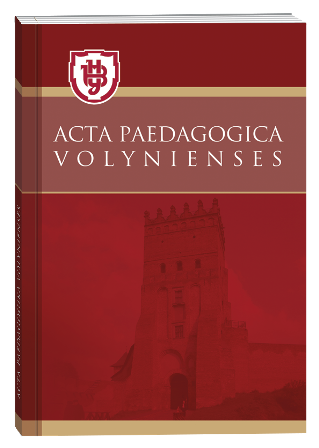РОЛЬ ЕМОЦІЙНОГО ІНТЕЛЕКТУ ПЕДАГОГА У ФОРМУВАННІ СОЦІАЛЬНО-ГРОМАДЯНСЬКОЇ КОМПЕТЕНТНОСТІ ДОШКІЛЬНИКА
DOI:
https://doi.org/10.32782/apv/2024.4.4Ключові слова:
емоційний інтелект, соціально-громадянська компетентність, дошкільник, педагог, вихователь, тренінг.Анотація
У статті наголошено на важливості дошкільного віку як початкового щодо розгортання рефлексивних процесів у формуванні «Я»-образу, коли відбувається закладання основи для подальшого розвитку базових якостей особистості. Розкрито сутність та надано визначення поняття соціально-громадянська компетентність дошкільника, виокремлено та закцентовано увагу саме на емоційно-ціннісному компоненті даного конструкту. Схарактеризовано роль дорослого, зокрема педагога у формуванні соціально-громадянської компетентності дитини дошкільного віку. Вказано перелік оптимальних показників розвитку емоційного інтелекту дитини дошкільного віку. Згідно мети статті, зроблено акцент на розвитку емоційного інтелекту педагога та його ролі у формуванні соціально- громадянської компетентності дитини дошкільного віку. При підготовці до статті було використано метод теоретичного аналізу психолого-педагогічної літератури з імплементацією безпосереднього досвіду авторів статті з вказаної проблематики. Окреслено взаємозв’язок емоційного інтелекту педагога з процесом формування соціально- громадянської компетентності дошкільника. Надано опис такої професійної компетентності вихователя «Психо- емоційна компетентність» та її основні показники, на які варто звернути увагу під час заходів щодо професійного розвитку вихователя. Надано визначення феномену «емоційний інтелект» та окреслено шляхи розвитку емоційного інтелекту педагога, зокрема вихователя закладу дошкільної освіти. Новизною роботи можна вважати наступне: виокремлено та описано напрямки практичної реалізації роботи з формування навичок емоційної компетентності педагога, а саме за допомогою тренінгових впливів. До цих напрямків належать: тренінги особистісного зростання з розвитку емоційного інтелекту педагогів; тренінги професійного зростання з розвитку емоційного іетелекту дошкільників; тренінги педагогічної рефлексії педагога. Надано загальне визначення поняття педагогічна рефлексія. Подано огляд тренінгів, запропонованих вітчизняними дослідниками в галузі розвитку емоційного інтелекту педагогів. Зроблено висновки про важливість розвитку емоційного інтелекту педагога для ефетивного виконання професійних обов’язків, в тому числі щодо формування соціально-громадянської компетентності дитини.
Посилання
Андрющенко Т. К. Нетворкінг «Розвиток емоційного інтелекту педагогів» у контексті компенсаторної освіти. Педагогічний вісник. 2023. №2. С.39-42
Боковець, О. І. Емоційний інтелект керівника як регулятор ділової взаємодії. International scientific innovations in human life. Proceedings of the 12th International scientific and practical conference. Cognum Publishing House, Manchester, 2022. С. 567-571. URL: https://ela.kpi.ua/server/api/core/bitstreams/c17bb17d-5f8b-4e63-8998-db1cf4c76d03/content
Волік Н. М. Тренінг для педагогів з розвитку емоційного інтелекту дітей дошкільного віку. Матеріали ІІ міжнародної науково-практичної конференції: «Актуальні питання сучасної педагогіки: творчість, майстерність, професіоналізм». Кременчук, 19.03.2021 року. URL: https://ojs.ukrlogos.in.ua/index.php/conferences/issue/view/19.03.2021
Волік Н. М. Розвиток емоційного інтелекту дітей дошкільного віку в умовах закладу дошкільної освіти: дис. … доктора філософії : 012. Запоріжжя, 2024. 299 с. URL: https://mdpu.org.ua/wp-content/uploads/2023/12/Disertatsiya_Volik-1.pdf
Деньга Н. М.Тренінг як засіб розвитку професійної рефлексії педагога. Витоки педагогічної майстерності. Серія : Педагогічні науки. 2016. №18. С. 79-85. URL: http://nbuv.gov.ua/UJRN/vpm_2016_18_15.
Дрібас С. А. Технології розвитку емоційного інтелекту у дітей дошкільного віку. Онлайн-курс підвищення кваліфікації. URL: https://genezum.org/course-details/tehnologiya-rozvytku-emociynogo-intelektu-u-diteydoshkilnogo-viku
Журавльова М. О. Емоційний інтелект як проблема психологічних досліджень. Наука і освіта: науково-практичний журнал Півд. наук. Центру АПН України. 2009. № 1/2. С. 57-61. URL: http://dspace.pdpu.edu.ua/jspui/bitstream/123456789/13973/1/Zhuravlova%20M.%202009.pdf
Зарицька В. В. Соціально-психологічні чинники розвитку емоційного інтелекту. Науковий вісник Ужгородського національного університету. Серія: Психологія. 2021. № 2. С. 19-22. URL: https://doi.org/10.32782/psyvisnyk/2021.2.
Кобильченко В. В. Базові сценарії занять з тренінгу педагогічної рефлексії. Дефектологія. Особлива дитина: навчання і виховання. Науково-методичний журнал. 2011. № 2 (60). С. 32-38. URL: https://lib.iitta.gov.ua/id/eprint/5593/1/%D0%9A%D0%BE%D0%B1%D0%B8%D0%BB%D1%8C%D1%87%D0%B5%D0%BD%D0%BA
%D0%BE.PDF
Косенчук О. Г. Соціально-громадянська компетентність дошкільника: сучасний освітній вектор. Дошкільне виховання. 2023. №5, С. 8-10.
Марусинець М.М. Рефлексивний тренінг як засіб формування професійних здатностей педагога. Актуальні проблеми психології. Зб. наукових праць. 2013. Т. 4, Вип. 9. С. 178-190. URL: http://www.appsychology.org.ua/data/jrn/v4/i9/18.pdf
Новак О. О. Шляхи розвитку емоційного інтелекту педагогічних працівників. Постметодика. 2010. № (6)97. С. 41-47.
Олійник Д. С. Формування соціально-громадянської компетентності у дітей старшого дошкільного віку. Інноваційні процеси в дошкільній освіті:теорія, практика, перспективи: зб. наукових праць: в 2-х ч..За заг.ред.: О.О. Максимової, М.А. Федорової. Житомир: ФОП Левковець, 2022. Ч.1. С. 73-76.
Про затвердження Базового компонента дошкільної освіти (Державного стандарту дошкільної освіти) нова редакція: Наказ МОН України від 12.01.2021 р. №33. URL: https://mon.gov.ua/static-objects/mon/sites/1/rizne/2021/12.01/Pro_novu_redaktsiyu%20Bazovoho%20komponenta%20doshkilnoyi%20osvity.pdf
Про затвердження професійного стандарту «Вихователь закладу дошкільної освіти». Наказ Міністерства економіки України № 755-21 від 19.10.21 р. URL: https://mon.gov.ua/npa/pro-zatverdzhennya-profesijnogo-standartuvihovatel-zakladu-doshkilnoyi-osviti
Про окремі питання діяльності закладів дошкільної освіти у 2022/2023 навчальному році: Лист МОН № 1/8504-22 від 27.07.22 р. URL: https://mon.gov.ua/npa/pro-okremi-pitannya-diyalnosti-zakladiv-doshkilnoyi-osvitiu-20222023-navchalnomu-roci
Про окремі питання діяльності закладів дошкільної освіти у 2023/2024 навчальному році: Лист МОН № 1/12490-23 від 21.08.23 р. URL: https://mon.gov.ua/npa/pro-okremi-pitannya-diyalnosti-zakladiv-doshkilnoyi-osvitiu-20232024-navchalnomu-roci
Швень Я. Л. Воркшоп «Розвиток емоційного інтелекту педагога». Методист. 2018. №9. С. 27-32.
Щодо організації освітнього процесу в 2024/2025 навчальному році у закладах дошкільної освіти: Лист МОН від 27.08.24 р. № 1/15368-24. URL: https://mon.gov.ua/npa/shchodo-orhanizatsii-osvitnoho-protsesu-v-20242025-navchalnomu-rotsi-u-zakladakh-doshkilnoi-osvity







